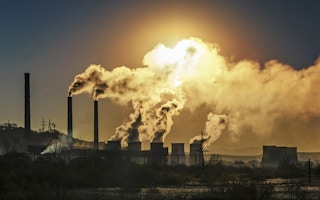Look out of any window in Singapore over the past month and there is no need to read any articles or books to understand what “an environmental problem with no boundaries” means. It is there in the air that everyone sees and breathes, created by fires miles to the south. The images dominating the news media are of a proud island state celebrating its 50th year choked in an acrid smoke haze that will not clear.
To continue reading, subscribe to Eco‑Business.
There's something for everyone. We offer a range of subscription plans.
- Access our stories and receive our Insights Weekly newsletter with the free EB Member plan.
- Unlock unlimited access to our content and archive with EB Circle.
- Publish your content with EB Premium.
It is a problem driven by numerous re-enforcing factors: social and economic dynamics intensified by an El Nino effect, meaning little or no rain for four months. And with the US National Oceanic and Atmospheric Administration predicting that – as with 2014 – 2015 will be the hottest year on record, one wonders whether living in a cloud of smoke will soon become “the new normal”.
Climate change is perhaps the ultimate problem with no boundaries. Whether in Europe, Australia or the United States, the emissions from the burning of coal, oil and other fuels have an impact on the warming of the atmosphere that we all share.
The emissions data from the current fires is likely to be shocking. The last major Indonesian forest fires in 1997 not only had a devastating effect on the landscape and human health; they also produced an estimated 40 per cent of the world’s greenhouse emissions that year. It was the biggest annual jump in carbon emissions on record.
The impacts of climate change are far more than environmental. Ten years ago when I was working at 10 Downing Street for Prime Minister Tony Blair, we expended a great amount of time and political capital trying to convince other world leaders that climate change was not solely an environmental problem. Failure to reduce emissions and the risks will have significant economic, social, health and security implications.
Blair knew that concerned as we are and should be about the future of polar bears or any other precious species under threat, it was the effects on people and human development that were most important to understand. That was the primary reason his government initiated the Stern Review into the Economics of Climate Change, a seminal piece of work that assessed and revealed the economic costs and benefits of acting to tackle climate change.
Whether you are a concerned member of the public, making decisions in business, or seeking to affect government policy, it is important not to see climate change as a matter of belief. Something you either believe in, or don’t. It is more a matter of risk. With more than 95 per cent of peer reviewed scientists concluding that the atmosphere is both warming and carbon dioxide and other human induced emissions are the primary cause, prudence and good sense dictate that we should do all we can to reduce the risks associated with the climate problem.
And as the business mantra goes, with risk comes opportunity. As the world moves away from high polluting, inefficient and high emitting ways of generating electricity, creating and transporting products, new more sustainable, carbon efficient, low emissions processes and technologies will take their place. Moving to these new low carbon practices, technologies and approaches is also likely to have important co-benefits.
“
Climate change is an issue moving to the mainstream: major businesses will increasingly need to see low carbon as intrinsic to their activities.
But this is no easy transformation, particularly in Asia. In 10 years between 2001 and 2010, 79 per cent of new global energy demand was concentrated in the region. And most global growth in energy was in dirty coal used for electricity production. Reversing this trend will require stable and continuous policy at international, national, regional and city levels.
With the next major United Nations conference on climate change in Paris in just three weeks tasked with reaching on a new global climate agreement, there is a real possibility that this will further embed low carbon in national policies and business practice.
The signs are auspicious. China and the US, so long dragging their feet on the issue, are now leading the way. The G20 have committed to phasing out fossil fuels by the end of the century and with China (the world’s largest economy and emitter) now committed to its carbon emissions peaking in less than 15 years, the basis for agreement is stronger than ever.
But even perfect international or national policies will need to be supported by business. It is they who drive the economic activity in society. Climate change is an issue moving to the mainstream: major businesses will increasingly need to see low carbon as intrinsic to their activities. Not because they want to be seen to be ‘green’, but because they want to be part of reducing the risks of climate change and environmental pollution rather than adding to them.
And great businesses, like energy systems, are never static. They are an amalgam of decisions and processes driven by strategy. The whole of the 20th century has been characterized by a succession of transitions in energy technologies, and massive global companies like General Electric, IBM or Apple are constantly innovating to make products in different ways.
When looking out the window on the haze, or delving into the implications of climate change, it is all too easy to become despondent and disengage.
But we must not.
Al Gore famously called climate change “an inconvenient truth”. He was right. But more importantly, it is also an enabling truth: a problem we can, many are, and more must, do something about.
Nick Rowley is part of international sustainability consultancy Robertsbridge. Previously he advised Prime Minister Tony Blair on climate change and sustainability.











